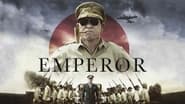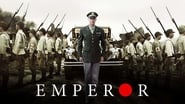Marketic
It's no definitive masterpiece but it's damn close.
MoPoshy
Absolutely brilliant
Maidexpl
Entertaining from beginning to end, it maintains the spirit of the franchise while establishing it's own seal with a fun cast
Neive Bellamy
Excellent and certainly provocative... If nothing else, the film is a real conversation starter.
krool1969
This is one of the best movies I've ever seen. It covers a historical event where government officials acted in a wise manner, and in a way that could badly damage their political standing.At the end of WWII the American people were very angry with Japan and the Japanese government for the sneak attack that killed 2000 Americans, all of the Americans killed in the war and atrocities committed by the Japanese against American POW's. Much of this anger was directed at Emperor Hirohito who was seen as the instigator of the war.General Douglas MacArthur was placed in charge of the occupation force in Japan and tasked with the job of finding and arresting war criminals. MacArthur knew what the execution of Hirohito would do to the Japanese people and desperately needed an excuse to spare him.The film follows the efforts of General Bonner Fellers who, under MacArthur's orders was placed in charge of this difficult job. Fellers though has another very personal mission: Discovering the fate of a young Japanese woman he had fallen in love with before the war and tried to protect after being placed in charge of strategic bombing missions against Japan by rerouting them away from where she lived.Several people share their stories with him of what happened during the war, including his girlfriend's uncle who had served in the military in the war.It is rare for government officials to act wisely and even more rare for film makers to produce such a fine work as Emperor!
don2507
As a history buff I enjoyed this film. It's a thoughtful and (for the most part) balanced view of the dilemma facing MacArthur and the American occupation of what to do about Emperor Hirohito at the end of the Pacific war. The American public and the Justice Department want the emperor tried as a war criminal and most likely hanged, while MacArthur knows he needs the emperor and his mystical appeal to the Japanese as a veritable god to effect the enormous political and social changes that he and the occupation authorities are planning for post-war Japan. In addition, the United States is beginning to see Japan as a potential ally in east Asia as relations with the Soviet Union deteriorate and the Chinese civil war continues. But MacArthur has his eye on the Presidency in 1948 and so he instructs his associate Brig. General Bonner Fellers (Matthew Fox) to evaluate in only 10 days whether Hirohito should be arrested and tried as a war criminal, thus displacing some of the anger of the American electorate onto Fellers if Hirohito is not tried. The 10-day evaluation period comprises a search for Hirohito's associates to solicit exonerating information about the emperor's wartime culpability and constitutes the focus of the film.Tommy Lee Jones plays Gen. MacArthur and he conveys the necessary swagger and command presence (see "The Fugitive") that the imperious general wore like a second skin. He doesn't have MacArthur's famous speech diction, and in this regard Gregory Peck made a better MacArthur. Matthew Fox makes a very conscientious Gen. Fellers, and the Japanese actors, who are obscure to us but famous in Japan, do a marvelous job of portraying dignified, protective, demure (dare I say it: inscrutable) imperial officials who cannot explicitly exonerate the emperor but neither can they point to incriminating evidence. The emperor's role in 1930s-1940s militaristic Japan was indeed inscrutable; he did more than simply rubber-stamp the militarists' aggressive plans but his responsibility as head of state in such a government and culture was hard to evaluate, and the Japanese officials Fellers interrogated said as much. It is, however, interesting to note that more recent histories of Hirohito's role in wartime Japan have suggested his culpability was greater than earlier thought. In the film Gen. Fellers uses Hirohito's role in overcoming Japan's August 1945 Cabinet deadlock by directly speaking to the Japanese people to "endure the unendurable" to justify maintaining the emperor's role in post-war Japan, and MacArthur agrees which allows him to meet with the emperor, have that famous photo taken with just the two of them, and then proceed to unify the Japanese under the emperor's continuing presence to effect his reforms and to make Japan a U.S. ally in the post-war world.It is interesting to note that some of the same political (cold-war) issues were confronted in Stanley Kramer's "Judgment at Nuremberg"; some of the U.S. occupation officials in Germany were advising the prosecutors to be lenient with some of the Nazi judges on trial because Germany was going to be needed as an ally against the Soviets. Was "justice" conferred on Hirohito? Probably not, according to some recent post-war histories, but as "Emperor" honestly depicts, both the senior Japanese leaders and the American occupation officials, most of all MacArthur, realized that Japan could not be rebuilt and reformed, at least not as quickly or as easily, without the emperor's presence as a unifying symbol, albeit a de-divinized one, in post-war Japan.
petarmatic
It was interesting to watch how immediate end of WWII in Japan affected the Emparor Hirohito.My parents love Japan. They visited Japan on many occasions, and I am pleased to say that my father dined with Emparor Akihito, son of Emparor Hirohito, the main subject of this film.I am always interested to watch films about when unthinkable turns into reality. I am sure many of the inner circle around Hirohito never thought that he was going to be for surrender. But his reasonable thinking prevailed. He saved many Japanese cities from the devastation of the American nuclear bombs. Only later we knew that his reasonable thinking prevailed and how dramatic was that night before his radio broadcast to the Japanese people.As far as film goes, since it was based on a true event, there is not much to add, plot is interesting.Acting is a little bit to be desired, that is why I gave 6 out of 10 to this film and not 7 out of 10.All in all if you interested in the historical films, especially ones dealing with the historical acts this is a film for you.
kosmasp
While not really something that has any relation to something happening right now or when the movie came out, this sort of history lesson is quite nicely done. Matthew Fox back in a plane (brings back memories, I know), but lands quite safely in Japan. Namaste indeed. But that's not where the movie ends, it's where it begins. With the back-story of Foxs character and what Tommy Lee Jones character tries to do, we have a lot on the line.And while they are playing real life people (people that existed/do exist), I'm not sure where they took some liberties for dramatic purposes. I do know they tried to be as open minded and respectful to the portrayal of Japan. And I think they did succeed in that. A drama thriller that is surely more interesting to some people than to some others.







